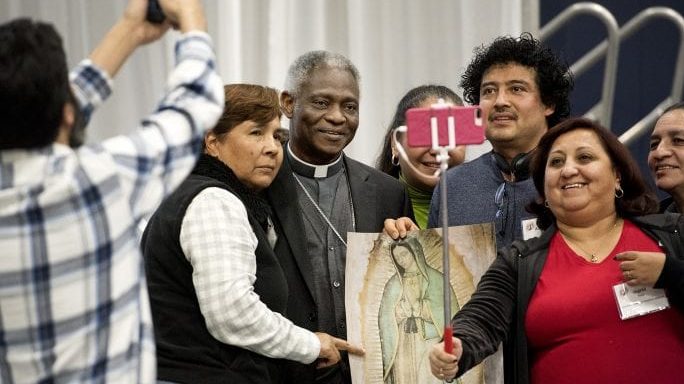On Saturday two of Pope Francis’s most trusted advisors took part in the latest edition of the World Meeting of Popular Movements, which has been supported by the pope since the early days of his pontificate.
The meeting brings together grassroots organizations from five continents working with the poor and marginalized, with the goal of letting them become the protagonists of their own stories.
Cardinal Peter Turkson, Prefect of the Vatican Dicastery for the Promotion of Integral Human Development, was one of the people addressing the meeting this year, held online due to the COVID-19 pandemic.
“There are inequalities, lack of access to health, cruel economic systems, that is why the [COVID-19] virus exposes us to many other pandemics that must be dealt with,” he said.
Al these other pandemics, Turkson said, “all have one thing in common: They undermine human dignity.”
Turkson said that Pope Francis’s latest document, the encyclical Fratelli Tutti is an appropriate response to these deficiencies.
The World Meeting has gathered several times, the first time in Rome in 2014. Francis has taken part in some of them, including two in Rome and one in Santa Cruz de la Sierra, Bolivia.
Cardinal Michael Czerny pointed out that this new meeting was part of the culture of encounter “indispensable for progress” and an opportunity to “learn in a new context” of pandemics. He issued a clear invitation to personal conversion, asking those gathered to ask themselves a series of questions Francis posed in Fratelli Tutti, such as “how much love did I put into my work?” and “how much social peace did I sow?”
The participants of the meeting issued a seven-page document to be presented at an event on the economy hosted by Pope Francis due to take place next November.
“We know that none of what we propose is possible with the current balance of power that is determining relations between nations and within them,” they acknowledged in the document. “We know the power that money possesses to subordinate governments, maintain the status quo, expand the privileges of elites, and reduce the rights of the majority.”
“We also have confidence in the ability of the peoples to resist injustice and transform reality,” the document says. “We therefore take on the task of building popular power so that workers and poor people become protagonists of the change that the world needs, because, as Francis has stated, ‘In your hands, in our hands, lies the future of the humanity’.”
The proposals go along five main lines: Integral ecology and common goods; economic democracy; land, shelter and labor; education, health, communication and technology; sovereignty, human mobility and peace.
The document, titled “The Economy of Francis,” argues that it’s necessary to imagine an alternative system to the “globally hegemonic capitalist system,” to eradicate the “worldwide idolatry of money that structures the global economy,” to advance an economy centered “on nature, on men and women.”
During these meetings, the members of popular movements argued, they have been able to hear the “revolutionary preaching of a shepherd of peoples who summons the poorest folk to be protagonists of their own destiny and who calls them to lead the process of change that the whole of humanity needs.”
“We are aware that certain sectors seek to domesticate his thinking and confine it within the narrow margins of administering what already exists,” they write.
Acknowledging that they can’t claim to have the only correct interpretation of the pontiff’s thoughts, the group proposes a vision that they consider to be in tune with the radical nature of Francis’s teaching and the revolutionary nature of Christianity.
Most of the proposals are the expected ones for such a document: Access to clean water as a right for all; a serious campaign to reduce the carbon footprint; the planting of native trees; recycling; and international minimum income; the elimination of tax heavens that allow the world’s richest to avoid their obligations; and the implementation of a tax policy aimed at “all industries that cause damage to the physical or mental health of the population,” from arms manufacturers to gambling, fast food and alcohol, to create a fund for providing free access to health care at all levels.
Others are a bit more far-fetched, including a new international currency issued by the United Nations, under the control of not one nation but of all countries, so that the “dollar and the euro will no longer be used in international transactions or as a source of speculation, since they create international inequalities and favor speculative attacks against national currencies;” implementing a People’s Agrarian Reform, to distribute land to all those who want to work it, with a maximum size of agricultural property; and the elimination of the International Monetary Fund and the World Bank to replace them by institutions that serve the international community and not the “colonial interests of the powerful countries.”
Others, still, are even more radical, such as promoting alternatives to private property, such as “state property, cooperative property or community property.”

